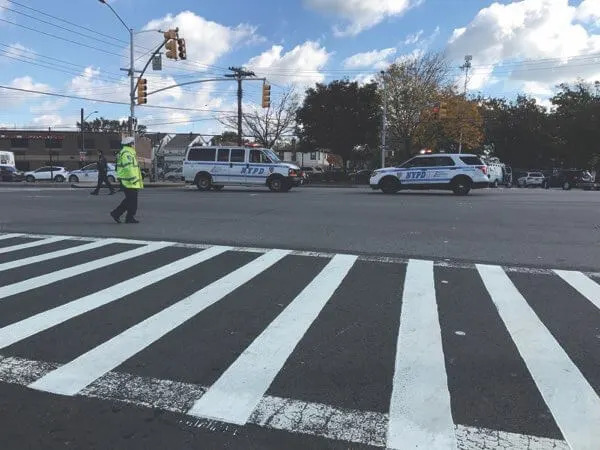Thirty students…
By Dustin Brown
While representatives of the Anti-Defamation League arrived at Newcomers’ High School Monday planning to present students with some lessons on combating prejudice, they left after learning some lessons themselves from the students.
Thirty students were on hand to watch ADL’s ceremonial donation of the book “Hate Hurts: How Children Learn and Unlearn Prejudice” to 280 high school libraries and teacher resource centers throughout the city.
“The book grew out of a question my son asked me after the Columbine shooting,” explained one of the book’s authors, Caryl Stern-LaRosa. “He asked me, ‘Why do people hate?’ I struggled to answer his questions in a way a 5-year-old would understand.”
The book is written in a style that caters to every age, offering anecdotes and lessons to help readers understand hate and develop productive responses to it. It is the product of a partnership between Barnes & Noble bookstores and ADL, whose mission since 1913 has been “to stop the defamation of the Jewish people and to secure justice and fair treatment to all citizens alike.”
“I have to admit there is no better place to receive this than Newcomers’ High School,” said Board of Education President William Thompson, praising the school which for the past six years has welcomed a student body comprised entirely of immigrants. “The reputation of this school and of your principal is not just citywide. There are people who talk about this school on a national basis.”
Although the Newcomers’ High School library will get its own copy of the book, the students at the ceremony were already well-versed in its lessons, having trained as peer leaders through ADL’s A World of Difference Institute, with Stern-LaRosa as the director.
The nationwide program, which was initiated in 1985 and began at Newcomers five years ago, teaches students to confront prejudice and celebrate diversity.
Thirty students at Newcomers come to school an hour early three times each week for a class which began with the ADL program. Teacher Julie Mann said the students’ activities can range from discussing literature in class to protesting injustice at city rallies, and often includes visiting other classrooms to teach their peers about combating prejudice.
“We fight against everything — racism, sexism,” said Assaba Linda Massougbodji, originally from Togo in western Africa.
“All the -isms,” added her classmate Awo Busumsi, also from Togo.
While the United States becomes increasingly known for harboring the hatred that produced Columbine and other tragedies, the students made it clear that America also makes it possible to appreciate differences in a way no other country can.
Two students who spoke at the event both said they left countries where everyone looked the same, where it was easy to accept stereotypes of people different from themselves because there were so few chances to interact with them.
“I came from a city where we don’t know about these things,” said Phara Bernadin, 19, originally of Port-Au-Prince, Haiti, who moved to Queens in 1996 and graduated from Newcomers three years later. “Now I see people in a whole different way. I see them for who they are, not what they look like.”
Laura Burlacu, 17, who moved from Romania two years ago and boasts a 95 grade-point average at Newcomers, said her experience at the school has had a profound impact on her opinion of people.
“I used to judge people before knowing them,” she said. “I also used to make fun of people who were handicapped or gay or lesbian.”
After joining the World of Difference program, she volunteered at a nursing home for gays and lesbians.
“I learned that gay people are people with feelings, lives and everything else,” she said.
Students in the audience said Bernadin’s and Burlacu’s experiences are fairly common stories at Newcomers.
“When she was speaking, I feel like it was me speaking,” Busumsi said. “You don’t really talk about it, but you feel it.”
Reach reporter Dustin Brown by e-mail at Timesledgr@aol.com or call 229-0300, Ext. 154.






























